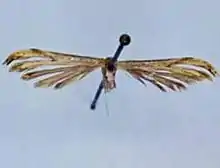Emmelina buscki
Emmelina buscki is a moth of the family Pterophoridae first described by William Barnes and Arthur Ward Lindsey in 1921. It is found in North America, including Florida and Mexico,[2] but has also been recorded from Costa Rica and Jamaica.
| Emmelina buscki | |
|---|---|
 | |
| Scientific classification | |
| Kingdom: | Animalia |
| Phylum: | Arthropoda |
| Class: | Insecta |
| Order: | Lepidoptera |
| Family: | Pterophoridae |
| Genus: | Emmelina |
| Species: | E. buscki |
| Binomial name | |
| Emmelina buscki | |
| Synonyms | |
| |
The wingspan is 20–21 mm. Adults are tawny or brownish white, the abdomen with a slight brown dorsal stripe and some brown scales on the sides and below. The forewings are whitish tawny with scattered brown scales forming a dot in the cell and a dash before the cleft which projects toward a costal spot beyond the base of the cleft. The fringes are gray brown. The hindwings and fringes are gray brown.[3] Adults are on wing in February, August, September and December.[4]
The larvae feed on Ipomoea indica.[5] They skeletonize the young leaves of their host plant.
References
- "460151.00 – 6159 – Emmelina buscki – (Barnes & Lindsey, 1921)". North American Moth Photographers Group. Mississippi State University. Retrieved June 13, 2019.
- Neotropical Pterophoridae 8: The genus Adaina Tutt, 1905 (Lepidoptera: Pterophoridae)
- Contributions to the Natural History of the Lepidoptera of North America
- "Neotropical species of the family Pterophoridae, part II. Zoologische Mededelingen Leiden 85 (2011)". Archived from the original on 2013-10-16. Retrieved 2011-12-22.
- Annotated Checklist of the Pterophoridae (Lepidoptera) of Florida